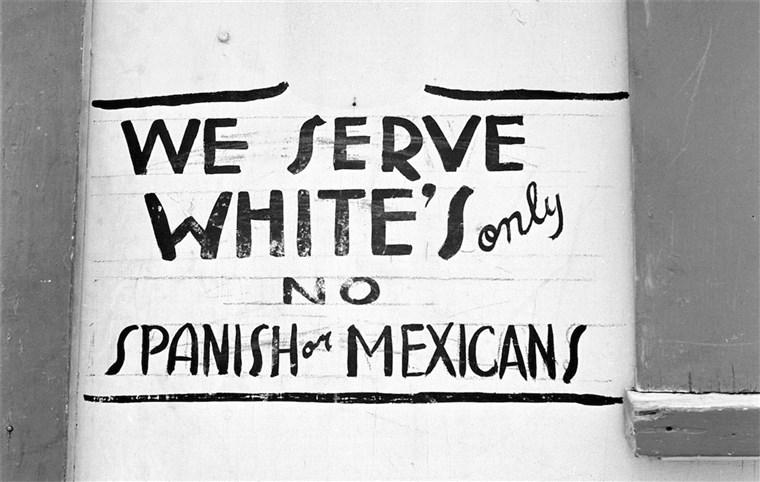
Racism, segregation, separation: What the U.S. and Nazi Germany now have in common
Talking about the Holocaust in the 21st century seems both recidivist and diachronic. Many may think that "the past is past" but others, especially historians,…
Since Donald Trump won the presidential election in 2016 - thanks to a campaign based on racism and hatred against the immigrant - historical alarms have escalated, especially because of the thin parallels between a story that began at the beginning of the 20th century and the new American political era.
Let us be clear: no, Donald Trump is not Adolf Hitler, and the present-day United States is not Germany after the First World War: a nation that has just lost out of a world conflict, with an impoverished economy and trampled morals.
But when a world power insists on making enemies where there are none and blaming a "race" for all its ills, it is only natural to feel that we have heard this song before.
After the First World War, Germany emerged as the so-called Weimar Republic (1919-1933), where the defeat, the abdication of the emperor, the communist threat and the humiliation suffered by the Treaty of Versailles allowed the common German to feel that the world was (literally) against him and that the only thing that remained was the nationalist "moral" to get ahead.
With a serious economic crisis on its back, it was to be expected that the community defeated during the war would find words of encouragement in a small guerrilla group that promised to return Germany to its former glory.
In comparison, the modern United States perceived eight years of ideological revolution under the mandate of the first African-American president, alongside one of the worst financial crises in its history in 2008 caused by the collapse of the housing bubble, which decanted into a crisis of international proportions.
The American in the street - what Claude S. Fischer calls the White Working Class (WWC) - suffered for years from an "economic dislocation," where his needs were ignored by each party of the government, creating a "powerful cultural resentment" against the immigrant, and a nostalgia for a previous "grandiosity" that many find hard to locate in the historical map.
This was the perfect recipe for the success of an "authoritarian" campaign, where the "hard hand" and expiation of blame through a particular ethnic group was the fundamental tool.
For many, comparing anti-Semitism with anti-immigrant positions (anti-Hispanic, more specifically), seems to be farfetched, but is it really?
The so-called "anti-Jewish feeling" of Europe had its roots in Christianity and the displacement of Jewish communities can be traced back to the Roman Empire. That is why this community was forced for many years to "disguise" their religious practices or even adopt Christian traditions to avoid living in marginality and achieve emergence in the middle of the European economy.
It was during the twentieth century that the Jews were blamed for the German defeat in the First World War - something historian Heinrich von Treitschke had warned of between 1879 and 1880 calling them "our misfortune" - they were associated with Bolshevism and even attributed the authorship of "economic conspiracies" to weaken Germany.

No, anti-Semitism was not an invention of Hitler and his associates - in 1933 there were more than 400 anti-Semitic associations in the country - but it was a political tool to get to power.
And in the United States, segregationism is not an unknown concept.
Since colonial times, the nation has been deeply divided by color, language, and religion. The legal and social sanctions of privileges and rights were rooted in the nation for centuries, and the struggle for civil rights is only the youngest of those chapters.
What many don’t know is that it was not only African-Americans who were the victims of endogenous American racism. There are also records of massacres against Mexicans between 1848 and 1928 that add hundreds of people killed at the hands of street violence and lynchings in Texas alone, and their collaterals are currently transformed into legislative amendments that continue to take away civil rights from the Hispanic community, like the famous SB4.

No, Donald Trump did not invent racism in the United States but used it as a political tool to take over the government of one of the greatest powers in the world.
“The Jew was never a nomad, but only and always a parasite in the body of other peoples,” explained Adolf Hitler in his text, "My Struggle."
"When Mexico sends its people, they’re not sending the best," said Donald Trump during his presidential campaign. "They’re sending people that have lots of problems (...) they’re bringing drugs, they’re bringing crime. They are rapists."
If we put both assertions in context, the distance is not large.
It is true that Hitler had an academic and military background that is far from the limited "commercial" experience of Donald Trump, but both leaders focused their anger on a single community and blamed it for the evils of their voters.
Similarly, both spent their first months in power passing anti-immigrant laws.
Hitler, for example, passed more than 1,400 laws between 1933 and 1939 against the Jews, the first of which was the official declaration of the economic boycott against Jewish shops and businesses, something like Trump's "hire American, buy American".
While the measures of Hitler's party allowed the racial "purification" of all wings of government and public service, and gave rise to absolute segregation, perhaps for Donald Trump the work is more difficult but no less possible.
RELATED CONTENT
The White House has chosen to attack the immigrant community through the dismantling of previous policies, inaugurating the administration with a promise of a border wall, the militarization of the border, the authorization of a new program of incentives and reinforcements within the Immigration and Customs Agency for the persecution and immediate detention of "illegal" immigrants, and the suspension of protection programs for undocumented youth who arrived in the country as children.
Let's say it is something like the "modernization" of the methods of persecution.
In July 1933, when Nazism was transformed into the only party in Germany, all Jews were stripped of their citizenship. In June 2018, the government under Donald Trump decided to expand its efforts in its citizenship and immigration offices to "begin to denaturalize people who should not have naturalized in the first place."
It is fair to point out that the Jewish community in Germany was being expelled from what they had known as a home for decades, and that, subsequently, their struggle focused on getting out of the territory before dying inside it.
In the case of the Hispanic community in the United States, the measures of the Trump government have tried to expel Latinos who have spent decades creating a home, and those who are detained at the border are desperately trying to enter while fleeing from worse terrors in their countries of origin.
At this moment anyone could say, "well, at least we don’t have concentration camps".
Is this completely true?
The first mass deportation carried out in Germany against the Jews was in October 1938, when 16,000 Polish Jews were expelled from the country and abandoned on the border with Poland.
But since 1933, the Nazi government had established overcrowded centers for detained Jews, which gradually became concentration camps following the protocols of the first camp in Dachau, which lasted until 1945.
Men, women, and children were systematically separated, and in very few cases the families met again.
Moreover, the desperation of the persecuted forced them to give their children to strangers who could help them cross the border into countries outside of Nazi domination.
"Separation tormented both parents and children," recalls the United States Holocaust Memorial Museum. "Each feared for the other’s safety and was powerless to do anything about it. Youngster and parent often had to bear their grief in silence so as not to jeopardize the safety of the other. For many hidden children, the wartime separation became permanent."
Since the U.S. government authorized the implementation of the "zero tolerance" policy on the border, around 2,000 children have been separated from their families upon entering the country without documents, which has forced immigration agencies to "improvise" detention centers for children and minors that are now processed as if they entered the country by their own will and without the company of an adult.
'It reminded me of going into an animal shelter.' — Border Patrol is detaining children in cages. pic.twitter.com/bUUdX9tJx1
— NowThis (@nowthisnews) 18 de junio de 2018
Today, the "concentration camp" for immigrants in the United States is called "the Tornillo tent camp" in Texas, which has 400 beds for young people who have been displaced from other detention centers where dozens of other children are now housed after being separated from their parents at the border.
To say that the U.S. government does not promote nationalism and segregation would now be a historical irresponsibility.










LEAVE A COMMENT: